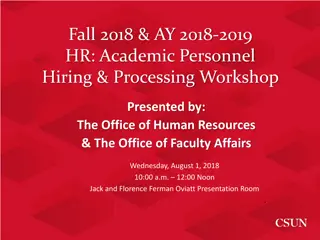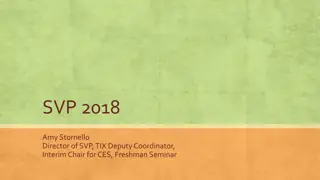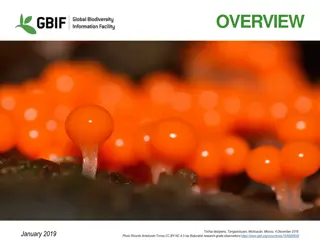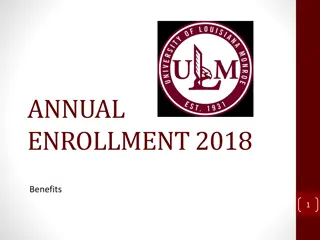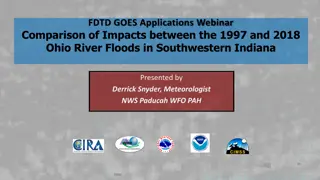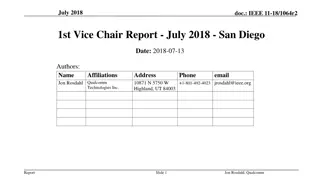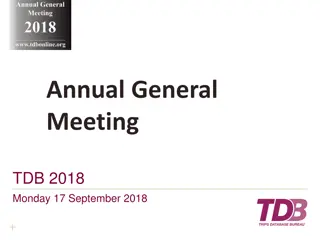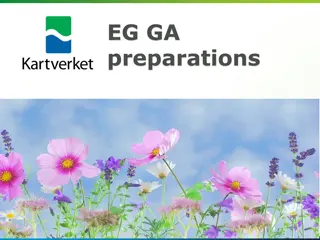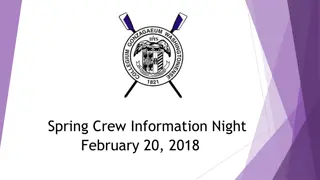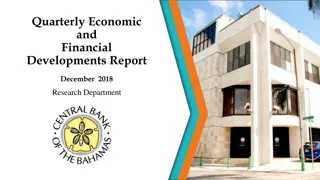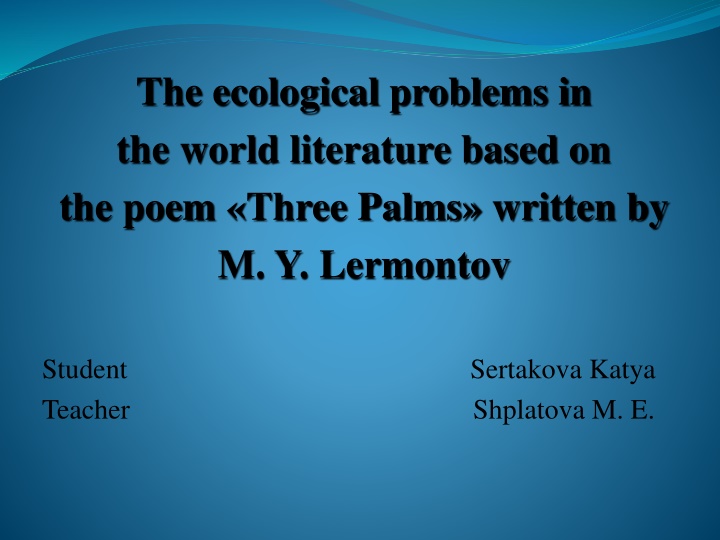
Exploring Ecological Themes in Literature: Insights from Lermontov's Poem 'Three Palms'
Delve into the representation of ecological concerns in world literature through an analysis of M. Y. Lermontov's poem "Three Palms." This discussion highlights the enduring connection between humanity and nature in literary works and emphasizes the importance of ecological awareness and conservation. Discover how literature reflects mankind's relationship with the environment and the profound impact it has on our understanding of ecological principles.
Download Presentation

Please find below an Image/Link to download the presentation.
The content on the website is provided AS IS for your information and personal use only. It may not be sold, licensed, or shared on other websites without obtaining consent from the author. If you encounter any issues during the download, it is possible that the publisher has removed the file from their server.
You are allowed to download the files provided on this website for personal or commercial use, subject to the condition that they are used lawfully. All files are the property of their respective owners.
The content on the website is provided AS IS for your information and personal use only. It may not be sold, licensed, or shared on other websites without obtaining consent from the author.
E N D
Presentation Transcript
The ecological problems in the world literature based on the poem Three Palms written by M. Y. Lermontov Student Sertakova Katya Teacher Shplatova M. E.
Earth, air, fire and water are the elements of life on our planet. They have always occupied a prominent place in the artistic knowledge of Man by himself. From The Tale of Igor s Campaign to The Twelve by Alexander Blok, from the Russian epic about the plowman to the modern Village Prose our literature has been linking the life and fate of the Russian people with the life and destiny of nature.
Man and Nature
Knowing the world, Mankind has accumulated practical knowledge of communication with Nature. Little by little, there was a clear idea about the kinds of plants and animals, their habitats and conditions of life. These were the first steps of the creation and development of Ecology as a science.
We are the children of nature. So we must know and respect its laws. There is no other way; not today, in this interdependent, ever globalizing world. And Nature we must always remember Four laws of ecology written by an American ecologist Barry Commoner: -Everything is connected to everything else -Everything must go somewhere -Nature knows best - There is no such thing as a free lunch interacting with
M. Lermontov, one of the greatest Russian poets of the 19thcentury, wrote about the protection of the environment in the poem Three Palms. The poem was created in 1839. It is a short simple story that teachers us a moral lesson. characterized by proud aloofness from existence, contempt gravitation to eternity feelings of joyful happiness and moral harmony with nature visited the poet in his wish to reach eternity. His poetry is for social and being, The God.
The main characters of the story are three palms that grow in the Arabian Desert. A cold stream flowing through the sands turned the lifeless world into a magical oasis, , , (sheltered under the shadow of green leaves from the burning sun and the sand dunes).
The action of the poem takes place in the beautiful eastern (In the sandy steppes of the Arabian land three proud palm trees grew high). Unfortunately, the idyllic picture has got one defect. This perfect place isn t available to people. nature.
Thats why the proud palms ask the Creator to help them to carry out their mission: to give shelter to a lonely stranger in the gloomy desert, : , ? (And started three palms to ask God, Were we born to fade here? )
And the Creator gives them a chance sending a caravan of merchants who don t like nature. They don t care about the hopes and dreams of proud palms. Soon they will cut down the palms to light fires. , ! (The ax hit the elastic roots and the age-old creatures fell lifeless!) As a result, the blossoming oasis will turn into a pile of grey ash, the cold stream will dry up without the green leaves and the Arabian Desert will become a lifeless place where any man can die without fresh water and trees.
In the poem M. Y. Lermontov touches on the problem of the relationship between Man and Nature. He writes that people are cruel by nature and they rarely appreciate the world around them. Moreover, they want to destroy this fragile planet for the sake of their own benefit. People don t even think that Nature knows how to defend itself from abusers. And this revenge is no less cruel and ruthless than the action of people who believe that the world belongs only to them.
And the poem ends with an apocalyptic picture: . (And today everything is wild and empty around )
For Russian always been a landscape forming an aesthetic taste, bringing up the idea of the beautiful. It has always talked about the naturalness of human existence and the origins of the universe. Russian people and for has literature nature
Literature https://en.wikipedia.org/wiki/Three_Palms http://pishi-stihi.ru/tri-palmy-lermontov.html https://en.wikipedia.org/wiki/Barry_Commoner

